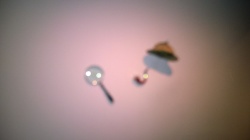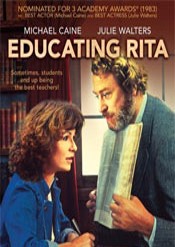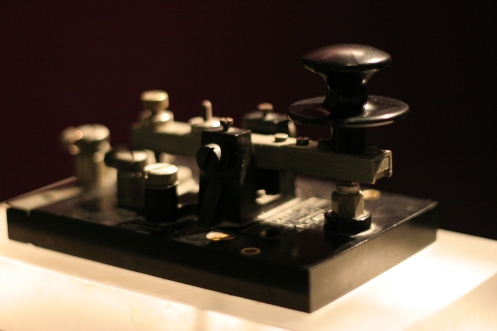So 20 minutes, and already Time is Running Out.
That should blow the cobwebs away; and given that I get to see Muse live in a couple of months, it’s just a fantastic way of kicking off the new year.
Well, it’s been so long that I can hardly remember what we were talking about.
Oh yes – we were going to move house. Well, nearly, but not quite yet.
It’s a longish story. Not because it is full of events, and plot-twists designed to keep you on the edge of your seat, or me on the edge of a meltdown, but because it is just, well, dragging a bit. I don’t actually complain about that, because it is the frenzy of such things that I find most stressful, even more then the importance of them. So I’m happy for things to move at a gentler pace.
But we are now actually in the throes of planning a move. Someone wants to buy our house; we have one that we want to buy. Mrs simonsometimessays has a weekly date with a kitchen catalogue; fionasomsetimessays has her eyes on some upgraded bedroom furniture; I look furtively through a different catalogue for my next piano. First things First, I say, supported by another brilliant Australian singer, Matt Corby.
Where we live now is a happy place – it’s just time to move along a bit. Don’t you sometimes get that feeling – that when things look like they are settling in for a long haul, you need new Plans? (And if you don’t feel like moving house, just follow that link to the fantastic Australian band, Birds of Tokyo.)
Well that’s how it is with us. See you on the other side.
I was wondering if I could finish this in under 20 minutes, and you know what? Like The Rubettes – I can do it. (That’s another video worth a look. The caps were really something.)

We’re going to do something a little different for this post. We give you a handful of pictures, and invite you – require you, even – to set this piece running as you look at them. This is Frank Ticheli’s Vesuvius. I’ve just discovered it, and I am hooked. It’s moody, atmospheric, melodic and original (and relevant). Memorable themes are supported by an instrumental arrangement which is simultaneously vibrant and subtle. Strongly reminiscent of Mendelssohn’s great gift for orchestration, but this is undeniably a 20th Century piece (only just, though: 1999).
Who is Frank Ticheli? I’m happy to say I don’t know. Perhaps I should be embarrassed not to know, but if I were embarrassed about all the things of which I am ignorant I would spend the rest of my days with the face the colour of the only tomato I managed to coax from a plant this year. So instead I take pleasure in the discovery of something new and wonderful – a whole new (to me) composer to explore. And at the risk of going off-topic, I can’t help but share this: Earth Song. Not the dreary Michael Jackson, but something altogether lovely. Come back to it when Vesuvius is over.
Sorrento: why now?
This is the first post that simonsometimessays has ever provided to a deadline. We’re up against it here, I can tell you.
Of course, my rather daft and romantic image of true art cries out against the erosion of the creative process by such a humdrum and unartistic factor as time. But when you consider that some of the greatest art of every kind has been produced to a deadline, the daftness of that image is truly revealed. I don’t actually need examples to know that Mozart and Shakespeare were both, regularly, writing some of their finest works right up to the day of performance.
Which makes me feel better. So what’s the hurry, then?
Well, you can blame or thank Anjali.
Anjali read the last post on these pages, the one in which I didn’t talk about Sorrento, and requested that I get round to actually talking about Sorrento before she goes there in the middle of October. So here, almost on commission and after a month’s reflection, is what I can remember.
So – less talk, more pictures

But catch the sky just as the sun is hanging under the clouds in the evening and you’ll think you’ve seen heaven.

I forget exactly what this is – probably the atrium to a patrician household. The swimming pool looks a little shallow, though.

Vesuvius – inside the crater. As soon as we can transmit smells digitally, you’ll get the full sulphurous effect.

From the top of Vesuvius: “…the devil took Him to a very high mountain and showed Him all the kingdoms of the world and their glory”
Anjali – have a lovely time.

Stop press
It had been the intention of the editorial team here at simonsometimessays to bring you a travelogue of our recent sojourn in Sorrento and its environs. That must now wait for a future despatch. Hopefully, we will by then have shaken off the temptation to adopt the prose style of an Edwardian newspaper’s foreign correspondent. Until that time you must be satisfied with our assurance that we will come back to Sorrento.
But now we must bring you news of enormous moment and serendipity. We can only hope that it means as much to you as it does to me. Or at least that I can explain with sufficient clarity for you to understand the depth of my emotion.
I’ll have a go, anyway.
Backstory: establishing credentials as fans of Franz Ferdinand.
Last year, through the kindness of our friend at Snig’s Kitchen, Mrs simonsometimessays and I had the opportunity to see a live show by Franz Ferdinand. Excellent. A few months later we saw them again, this time in company with said friend and other half. Also excellent.
Backstory: establishing credentials as fans of Sparks.
When I was quite small, Sparks broke through in the UK. The song that did it for them was This Town Ain’t Big Enough For the Both of Us. It was sensational in 1973 and remains sensational today. In fact, so magnificent a song is it that I was genuinely – really and truly – flabbergasted that my colleagues had never heard of the band. Not one of them. (I’d like to put it down to a superior musical education, but fear that it is probably more to do with a more natural process.) I think I’ve put them straight now, backed up by Sparks’s Number 1 Song in Heaven having featured in the Alan Partridge movie a year or two ago, though one or two people in the office still looked baffled.
Discovery
We discovered at the beginning of the year that Franz Ferdinand and Sparks were coming together as a supergroup under the name F.F.S. (genius). That was a discovery engendering great excitement. The album they wrote and recorded together justified the relish with which we anticipated it, and then we heard (thanks again to Snig’s Kitchen) that F.F.S. would be touring. Finally, we secured tickets back in the Spring, giving us several months of looking forward to the gig. Which we attended last week. Oh, what rapture.
More backstory: establishing Sherlockian credentials
So far so brilliant. But we’re not done yet. We still haven’t completed the circle. There’s a whole chunk missing – the Sherlock Holmes chunk.
Have I mentioned before my interest in Sherlock Holmes? Yes, of course I have. Well if you didn’t know before, you know now: I have such an interest. In fact, for “interest” you can read “fascination, obsession, nerdiness, geekiness”. Indeed, it’s not too much to describe it as a habit. But I have it under control. I can kick it anytime. I just don’t want to. And it’s hard when the gear is all around you…
…even at the F.F.S. gig.
The big reveal
Over 30 years ago, Sparks released an album called Angst in my Pants. Let’s pause a moment to honour them for the ingenuity of that title (surpassed only by Gratuitous Sax and Senseless Violins). And now let’s take a look at the tracklist, which includes – you know what’s coming – Sherlock Holmes.
It’s a fun song – not their very best, I admit, but it has proven itself catchy enough to be an earworm. My obsession forbids me to dislike it anyway.
Sparks hardly ever play it live. Until the gig last week, F.F.S. had never performed it. They waited until a certifiable, fully paid-up (literally) Sherlockian was in attendance, and then they played it. For me: I’m convinced of it.
I’m afraid that when I recognised the introduction, my reaction, to which Mrs sss can attest, was of unmitigated joy. For a few minutes I was a simpering half-wit. If the grin across my face had been any wider, the corners of my mouth would have met at the back of my head.
Most music is improved by the experience of a good live performance. In this case, the talents of two excellent bands combined to give us a third excellent band. The gig was superb. Sherlock Holmes, performed by F.F.S., just a hundred feet away from me, was superb.
(I can’t encourage you to follow this link. In fact, I positively discourage it. And if and when an official video ever becomes available, I’ll replace it immediately.)
The thoughtful bit
It may have meant more to me than to most, though I can’t know that for sure, can I? That’s what music does, isn’t it? I’ve tried to demonstrate that truth from time to time. The highly personal experience of music is its greatest wonder. For me, that song on that night was a moment of magic which connected so many things in a way unique to me.
I know that I won’t get that moment again. But it will always be there as one of the most unexpectedly wonderful things in my musical journey.
I’ll get little Darts of Pleasure whenever I remember it.

That’s another one of my Pavlovian lyrics – you know, the ones that come straight to mind, with the accompanying music, the moment I hear a particular phrase. In this case the phrase is “eight o’clock”, brought to mind by seeing what the time is.
It’s a line from the Boomtown Rats brilliant hit Rat Trap, the story of a young boy (Billy) and girl (Judy), unfulfilled and frustrated against a backdrop of stifling home lives and gang violence. It actually takes place at eight o’clock in the evening, and certainly was not intended to convey the image of a middlish class, middlish aged Englishman sitting up in bed on a Saturday morning. And – sorry, Mr Geldof – I don’t think that it came too well from the reformed Boomtown Rats in 2013 when they played at a festival. Find the video and see if you agree. I’m afraid it made me rather sad.
But back in 1978 (I thought that was the date, and whoopidoo, I was right), when I was listening to the track, which was a raw and incisive statement truly expressive of the times, I don’t think I imagined myself sitting up in bed, tablet on lap, tapping away to millions around the world*.
Let’s face it: I didn’t imagine a number of things.
Getting older, for example, let alone doing so with a part of me still thrilling from the cultural excitement of that time.
Computers, let alone laptops. And tablets? I mean, tablets are big stone things with commandments on them, aren’t they. Or medicines with the texture of chalk and the taste of soap. Occasionally Horse Pills.
Blogging. Well, those of us whose understanding and learning is rooted in language probably find it harder than others to envisage something for which there isn’t a word (which there wasn’t, then). If you’d shown me a neologism then I would have been more interested in the word Neologism than the neologism itself**.
I thought this was usual, almost universal, even; but it turns out otherwise. For a long time I did not realise that words do not explain stuff to many people. Pictures do. As time went on, it became clear that I was in the minority at work: people wanted fewer words, not more, to grasp ideas. Presentations with images (infographics, to the modern you and me) and lots of white space seemed to be essential to many, whereas I always wanted the words.
Different styles of learning? Of course, but perhaps it is surprising that in the world where publishing and law meet – and where I spent a lot of time – the value of clear language didn’t hold sway over the need for pictures.
It’s worse than that, actually: it feeds the wholly pernicious notion that an idea is no good unless it can be reduced to a simple image. What’s next? The Supreme Court delivering its judgments as comic strips? Parliament legislating by Powerpoint? Harrumph.
Harrumph again. How did I get onto this? Well never mind.
I’ll just track back a paragraph or two, to the idea that I always want words, and retract the statement in one important respect.
I do need words for intellectual understanding, but for emotional understanding I am led by the art. Whether I’m looking at a favourite picture (like the one here, bought along with the one at the top of this post, by Mrs simonsometimessays and me from an artist selling her paintings door-to-door), or listening to something beautiful, like Lou Harrison’s lovely Suite for Cello and Harp – I don’t need words, and I can never get bored.
* There’s one aspect of that that has still yet to come true. Guess which.
** That’s three occurrences of a keyword in one sentence – probably a cardinal sin for a blog; and no doubt compounded by a further repetition in order to link to the hypnotic Neologism by Nicholas van Orton***
*** Wow, a footnote to a footnote. That’s a new one for me. But I just needed to point out that this Nicholas van Orton has nothing to do with the character played by Michael Douglas in The Game, which in turn has nothing to do with Queen’s album The Game. How long could I carry this on for? Enough. But from that album give here’s one of the unusual tracks sung by Brian May rather than Freddie Mercury: Sail Away Sweet Sister.
Well, since I’ve been gone, actually, because I know you’ve been there all along.
What have we both been up to?
Well, quite a bit of stuff, actually.
- Theatre – a number of visits to The Globe, which as an audience experience is matchless. I’d show you a photo, but they are very strict there, and at the first sight of a camera you can see staff threading their way through the crowds like the secret service agents in a political thriller. The highlight was Shakespeare’s rarely performed history, King John, which is not easy to find a musical link to, so have something from the superb John King Band – Let your Hair Down. Elsewhere, I saw a gentle, poignant drama called The Dreamers – not to be confused with the not-quite-so-gentle, poignant movie Dreamers, notable for a visually candid performance by Eva Green.
- Music – Handel’s Xerxes, Paloma Faith, Sweeney Todd; even writing and recording some of my own, but I won’t trouble these pages with that until I’m famous for it. But top of the heap this time is Verdi’s La Traviata, with a brilliant conductor, at the last night of its run at Covent Garden. OK, yes, it’s the brother again – richardsometimessays. But if you’ve got it, flaunt it; and if you haven’t got it, flaunt someone else’s. I obviously can’t provide you with actual footage, but I can give you the next best thing – the incomparable Callas and Amami Alfredo.
- Work (lots of that). I may tell you about that anon, when I can make it sound as exciting to you as it is to me.
- Celebrating academic success. Not mine, but the reflected glory of Fionasometimessays and Carolinesometimessays both now having finished their university careers with First Class honours. To each of them I say, as the Stranglers would put it: Brainbox.
- Making the decision that it’s time to move house. You can have all the musical development of that as it unfolds.
- Hearing a modern star describe his school music teacher as a “goddess”, and “as good as it gets”. – That’s Annemariesometimessays, to you. (Incidentally, I occasionally have reason to curse the length of this surname.) And in gratitude – because he clearly needs my help – here’s James Bay’s Hold Back the River.
- Sick cat. Octavian, not the disambiguated Ptolemy, has something on his head which is either carcinoma or lymphoma – we are waiting to find out. In his honour, here – as part of your musical education and mine – is a little known Canadian 70s band of the same name. This song – I can’t stop myself from loving you – is so mainstream I don’t understand why they weren’t more successful. (Did you see what I did there?)
- Decorating. Again, not me. This is not my strong suit. I prefer to hold the paintbrush by the soft end.
So, that’s me (or various elements of my clever family) for the moment. But let’s not make this any more like a Christmas letter.
I’ve neglected our relationship. But I’ll try harder. I can change. It’ll be different from now on. I’m sorry.
With rue my heart is laden, for golden friends I had. (Stanislava Stoytcheva giving an unusual performance of Barber’s wonderful setting of Housman’s wistful words.)
But, Inutiles Regrets, as Berlioz has it.
Let’s speak soon.
Several years ago, an English judge (“Good morning, Judge“) got himself into slightly hot water.
In fact it looks more like mild criticism from the Court of Appeal – when it was called upon to review his judgment in a certain high-profile case – but as lawyers will know, even the gentlest reproach when uttered in public by such bodies resounds like the thunders of Zeus*.
Made of sterner stuff, however, than to be daunted by the utterances of the Court of Appeal, that same judge went on to attract more severe censure of his conduct of a subsequent case; but I tell you that for information only: if you wish to discover more, you know where to look.
Our present purpose is with the earlier case, which – just so you know what I am talking about – concerns the rather celebrated (at the time) allegation by the authors of The Holy Blood and the Holy Grail (a work of journalistic research making blockbusting revelations that would rock the Christian world, only it didn’t), that Dan Brown infringed their copyright by his book The Da Vinci Code.
Not so much a Code as an Enigma. You can go elsewhere for a full account of the story which was going to bring down 2,000 years of Christianity: in a nutshell, it’s complicated; but it rests on the premise that Jesus did not die on the cross but married Mary Madgalene, and their bloodline is the line of the true European monarchs. (Now let’s pause to reflect on how holistic the simonsometimessays view of the world is: The Holy Blood and the Holy Grail owes something in the inception of its suppositional history to Et in Arcadia Ego – see our earlier works, m’lud.)
Supposing that nothing would come of it, the judge decided that he would indulge himself, and he created his own code in which particular letters scattered throughout the judgment spelt out a message that was utterly irrelevant to the case.
Of course this was ill-judged; certainly it gave the Court of Appeal the ammunition to imply that the time he had spent on that was at the expense of clarity in the judgment itself.
Moreover, it allows us to speculate, at least, that he might have been ridiculing the premise of the original book, which is possibly not an ideal attitude for a judge to have.
Especially an English judge, in an English courtroom, with a position to keep up.
The English judiciary must sustain its worldwide reputation of loftiness, severity, incorruptibility, and maybe even even pomposity, so that we believe them when they say – in the words of The Human League (or Judge Dredd, if you must):
My own reaction (back to the story) when I read the Da Vinci Code, was “I’ve heard this before”, and it struck me as no less a quantity of bunkum at the second telling.
Each time, I happened to buy the book in question when there was something like outcry about it. And each time the fuss was raised by the Catholic Church, exhorting the faithful to ignore the book or speak against it where possible. The effect was of course quite the reverse: Catholics in their hordes bought the books without any apparent ill effects (this side of the grave, anyway) and non-Catholics who hadn’t heard of the books were suddenly alerted to them. You’d have thought that something would have been learnt from the experience of Monty Python’s Life of Brian, wouldn’t you? If you want grown up people to do something, all you have to do is tell them that they shouldn’t do it.
Since I have read both books, and regard them as being of equal merit (make of that what you will), I would quite understand if the judge was poking a little fun at either of them. However, I’m not a judge and I don’t have to worry that my impartiality would be questioned.
So, on with the story.
Almost 35 years since the Holy Blood and The Holy Grail was published, the world is unchanged by it. (It can’t have been helped by the publication of a sequel, rather devaluing its already suspect currency.)
Years after the original, the publication of The Da Vinci Code achieved equal failure in shaking the foundations of western civilisation. Even the making of a high-budget movie (with Tom Hanks, no less) does not seem to have made a difference.
(Spare a charitable thought, incidentally, for Margaret Starbird, who used the same basic premise for her 1993 book The Woman with the Alabaster Jar – which has somehow been forgotten along the way.)
Scarcely anything of consequence ever comes of things done solely to have an impact. The big ideas proposed by the authors of the Holy Blood and the Holy Grail were destined to make a splash but nothing more, because that is the only effect they were truly designed to have. Had they been of any weight or substance then a mechanism other than the mass-market paperback would have been chosen to promote them, and for a particular purpose. Big change happens for a purpose: if there’s no purpose, it’s just a big noise.
Accordingly, outside the courtroom, nothing of any significance emerged from the work, probably because there was nothing of any significance in it. And in the courtroom? Only some rather small points of law arising from allegations of plagiarism and copyright infringement. Hardly a ripple, save that the offended authors seemed to regenerate sales of their original book. Surprised?
Yet you shouldn’t be.
So we are led to wonder whether it was all an elaborate scheme, played out over three decades, with a disappointingly familiar motive. But I don’t really wonder that – it’s just another nonsensical theory to add to the pile.
Honestly: so many conspiracies, so little time. There are puzzles everywhere, staring you in the face. Everywhere.
In the end, It doesn’t matter any more.

Qtpfsgui 1.9.1 tonemapping parameters:
Operator: Reinhard05
Parameters:
Brightness: -10
Chromatic Adaptation: 0.5
Light Adaptation: 1
——
PreGamma: 1
*I wanted to link here to something by Mama Zeus, but it would have interrupted the Silver Thread of the narrative.

“Wouldn’t you simply die without Mahler?” – a line from Willy Russell’s Educating Rita, and the line runs through my head every time I hear Mahler’s name.
Russell is a gifted writer, and a good storyteller, but I have to confess I find him a little light on nuance. He paints his characters with broad strokes: their circumstances are real, their issues are those of everyone, and the words they speak could have been spoken by anyone – and therein lies my problem. A mark of a truly great writer is the ability to have their characters speak words which they alone could have spoken, and yet be utterly convincing and realistic.
Russell’s three best stories – and let me assure you I come back to them again and again – are Educating Rita, Shirley Valentine and Blood Brothers. They all have that same tendency to, well, not to surprise. The third of those, the musical Blood Brothers, has music also written by Russell, and he’s a talented composer. His tunes are good and sometimes very catchy, his arrangements strong and his lyrics stand comparison with the rest of the field. And yet, still, they travel well-trodden paths. Try this one (my favourite) – Easy Terms – and see if I’m right.
I began this digression before I even started, and since I promised myself that I only had 20 minutes before I go on to writing another post in another place, I had better stop. But now I’ve got another tune in my head now, suggested by the rhythm of the phrase another post in another place. So here is Abba’s Another Town, Another Train. An early song, from the time when the men in the group shared more vocal duties – before they hit their stride and left it to the people who really knew what they were doing. Abba didn’t really quite catch capture the persona of the loner who loves the girls and then, ruefully, moves on. But it’s a sweet song anyway.
Now, off I go. And since I really shouldn’t mention Mahler without linking to something by him, here’s Von der Jugend from Das Lied von der Erde (The Song of the Earth). A sprightly bit of romantic inspiration for you, in case you need it to survive.

Last night I went with annemariesometimessays to see Between Worlds, a new opera with music by Tansy Davies and words by Nick Drake – I mentioned it a couple of months ago. It’s from English National Opera (from whose website I have borrowed the featured image to this post – I hope they don’t mind), and on at the Barbican. For a decent account of it, check out this review from the Independent. But Oh, my word!
I went, already respecting someone bold enough to try anything dealing with the events of September 11th 2001. I expected to be moved; I expected to admire it; I expected good things all round. What I was not prepared for was how deep would be my emotional response. The music drew me in, especially the choral writing, which was breathtaking, and as Amsss mentioned seemed to capture an insight into crowd response that was also characteristic of Britten. The staging and direction were fantastic – all the photos online are from newspapers which makes it difficult to share them here, but the trailer from ENO gives you a flavour.
As with the whole opera, the title itself has layers of meaning. It refers at once to the worlds of characters who are trapped in an office high up in the North Tower; to the world outside, at street level where their loved ones are (and the street level is where the chorus act variously as witnesses, people who have got out of the building, and onlookers nearby or remote); and to a spirit world above them all, whose sole occupant is The Shaman, alternately prefiguring and reflecting the action below.
At the same time, the “between” part of the title can mean the state of being between life and death. We, the audience, know what the outcome will be but of course the characters do not. And as they are led gently to the realisation – tiptoeing towards the window – it is almost too much to bear. If you can, go to see it. And as Mark Anthony warned:
If you have tears, prepare to shed them now.
My immediate neighbours to the left, though, clearly found it quite bearable. Getting up from their seats at the end, She talked in a very matter of fact way about the acting, and He observed that E.N.O. always do “something wacky”. Oh, come on! Didn’t they FEEL anything? I really wanted to shake him roughly by the shoulders; and I might have gone on to mention that if he estimated the size of his clothes with more care then I would not have been subjected to more sight of his belly and buttocks than I usually enjoy at the opera. But I didn’t, but that’s the English for you. And more charitably, perhaps that is what was going on. Perhaps they were moved, and didn’t know how to show it, or were not articulate enough to express it.
Don’t misunderstand me – I like a little English reserve from time to time. But yesterday was not the time. It has often been observed that the human stories that came from that dreadful day are overwhelmingly ones of love. That point was not missed in Between Worlds. Neither were the horror, the fear, the stress and the despair that each character went through in their own manner, until love was the only matter left.
So, no links today. I can’t link to the music of the opera. And nothing else will do.
Let’s start the way we mean to go on:
In the days when there were B-sides to singles – when you actually had to take the record off the turntable and flip it over to play the other side – the B side was often the reason that you bought the single.
The standard formula – artist records album, a strong track from the album is released as a single, then maybe another, then the album is released – meant that you could guarantee that the single would be included on the album. A true afficionado knew that the unique musical aspect of the single would be the B-side, which usually consisted of a track not released elsewhere.
This was such an important point that a B-side which included another album track would have collectors foaming at the mouth with outrage. (I know – I’m one of them.) Artists with conscience were careful to observe that, and the Stranglers were among them. Hence Poisonality was only ever a B-side.
But even the Stranglers were not immune from the (some would say) cynical exploitation of their fans’ pockets, by releasing different versions of the single, with different B-sides, different cover designs.
Their early 90s single Heaven or Hell – which is brilliant – was released as a CD single, a 12” vinyl single and a cassette single (as well as in promotional form not available to buy). The CD single was actually 2 CDs in two stages: you bought the first one in a smart little case which had a space for the second. To a collector, that space was not an invitation but a command. The point is that if you wanted all the music – which added up to 5 additional tracks and a slightly extended version of the main song – you had to buy at least three formats of the same song.
You’d think, wouldn’t you, that artists would have recognised the value of keeping the fanbase happy? But hang on: No.
When I worked in a pub (back in the day when you had to add up the price of a round in your head before opening the till), the regulars understood that their value to the pub was not in simply turning up every night, but in parting with their money. Regulars didn’t get freebies: a regular who went away having drunk more than he or she had spent was costing the pub money, not making it. It wasn’t as if they were attracting other custom, either. Quite the opposite: there is something forbidding, and sometimes deliberately proprietorial, about the cabal of pals who congregate at the bar, demonstrating their chumminess with the landlord and looking with disdain at the innocent visitor who is almost certainly going to spend more per hour than the regulars nursing their drinks.
If they break into song – yes, I’ve seen that happen – it’s even more like they have been round the pub marking their territory. And rarely is such singing worth the hearing: somehow, impromptu musical merriment in real life never quite matches fiction, does it? If there were a bar where the casual drinkers suddenly launched into something as co-ordinated and rousing as Old Joe has gone fishing, I’d be back like a shot. That’s a round (see what I did there) from Britten’s Peter Grimes, which he characteristically uses to disperse the tension in the narrative of what is a bleak and desolate tale. Mrs simonsometimessays, who is not, as we have had previous occasion to observe, a lover of Britten, is inclined to think that his attempts at musical joviality and camaraderie do no more than rise from despair to misery. Judge for yourself.
How did I get here? Oh yes – as with the pub regular, so with the music fan. If they want to feed their passion, they must expect to pay. And in these days of free downloads, the pendulum has swung so much in the opposite direction that it is the artist who is the more easily exploited.
Now then, I’ve used the word Exploited twice, which more or less obliges me to offer you something from the band of that name. Don’t expect a tune, just a couple of minutes’ thrash from a hard early British punk band. and don’t adjust your PC’s audio settings – Computers Don’t Blunder.
Shall we return to singles? Well here’s a little gem by Peggy Seeger – When I was Single. Peggy Seeger is the subject of what is surely one of the most beautiful love songs ever – The First Time Ever I Saw Your Face – written by her then lover, and later husband, Ewan MacColl (that’s right, Kirsty’s Father). Peggy’s own recorded version of the song is, I have to say, disappointing; but perhaps I wouldn’t think so if I had not been weaned on Roberta Flack. It will be no surprise to see how many times the song has been covered – sometimes ruined with extra rhythm (Elvis), sometimes treated merely as a vehicle for the voice (any talent show performer), sometimes in the mistaken belief that the song would make them better, rather than catch them out (Johnny Cash), and occasionally with surprising cross-genre success (Jose Carreras). Personally, I think that this version – by the Stereophonics and Jools Holland – is hard to beat. The natural hoarse sadness in Kelly Jones’s voice, his range, and the slow, nostalgic beat bring something out that others don’t quite reach.
Right then: time’s up. Oh, all right, you twisted my arm. Here’s the fantastic Single Girl by Sandy Posey.

Saturday morning. Mrs sss and I are about to brave the supermarket, and in an unexpected move we are to be joined by a daughter.
I calculate that I have half an hour to share some quick thoughts with you.
I note that over at my favourite blog, The Dancing Professor has been reading The Once and Future King. I’ll let her tell you about it, but it got me just a little bit excited because (1) I wrote a little thing about Arthurian stuff not so long ago, and (2) I had in mind to talk soon about a recent musical discovery in my life: Tintagel, by Arnold Bax.
So you see, everything seems connected and purposeful, in a strange way that I can’t fully describe: I couldn’t help but feel a little stirred by it all.
Bax was a wonderful composer of symphonic poems. That term is shorthand for giving himself the licence to compose without regard for established form. Back in the day, when Bach and his successors were establishing the shape of symphonies and concertos (concerti, if you’re going to be fussy), there was an orthodoxy to their structure. It made the achievements of Mozart all the greater for making music that is surpassingly beautiful, even from within the constraints of form.
In our day, there are different constraints, but they are nonetheless there. The 3-4 minute pop song dominates the music industry, and demonstrates the process of musical evolution.
Thus, in the 50s, two minutes was the standard, probably because more than 120 seconds of energetic jitterbugging was all that health insurers would allow. Oh, Boy.
In the 60s the standard pop song got longer as the dances got a bit less frenetic, and the increased availability of various types of relaxant gave rise to a whole new genre of more languid and introverted pop and rock.
Bring on the 70s: glam-rock and disco (or D.I.S.C.O) made pop longer again. Inhabiting the dance floor became more about keeping the feet still, maintaining balance on ludicrous platform shoes, under the weight of shiny suits, medallions and trousers so wide that the wearer would be liable to take to the air in high winds. At the same time, early punk rediscovered the two minute explosion; the pogo was the dance, and I would be interested to know how much the increased demand on the National Health Service in recent years can be traced back to the knee-joints damaged leaping up and down to Love Song by the Damned.
You get the point, I hope.
My real purpose was to observe the structures a little. That they are there seems to me a matter of fact, not a matter of discipline. Without doubt the perceived expectation of the (once) concert-going, (later) record-buying and (now) digital-downloading public is the driving force in the structure of most music. Where Bax, and many others who have endured, really contribute is in opening up those structures from within.
John Lennon observed: “Before Elvis, there was nothing.” Well, kind of. Lawdy, Miss Clawdy.
So off to the supermarket we go. Quick March. And have a good Easter.






















